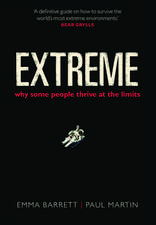Building, Defending, and Regulating the Self: A Psychological Perspective
Editat de Abraham Tesser, Joanne V. Wood, Diederik A. Stapelen Limba Engleză Hardback – 4 dec 2004
Preț: 769.37 lei
Preț vechi: 1030.44 lei
-25% Nou
Puncte Express: 1154
Preț estimativ în valută:
147.22€ • 154.12$ • 121.81£
147.22€ • 154.12$ • 121.81£
Carte tipărită la comandă
Livrare economică 05-19 aprilie
Preluare comenzi: 021 569.72.76
Specificații
ISBN-13: 9781841694054
ISBN-10: 1841694053
Pagini: 312
Ilustrații: 12 b/w images and 10 tables
Dimensiuni: 152 x 229 x 22 mm
Greutate: 0.74 kg
Ediția:1
Editura: Taylor & Francis
Colecția Psychology Press
Locul publicării:Oxford, United Kingdom
ISBN-10: 1841694053
Pagini: 312
Ilustrații: 12 b/w images and 10 tables
Dimensiuni: 152 x 229 x 22 mm
Greutate: 0.74 kg
Ediția:1
Editura: Taylor & Francis
Colecția Psychology Press
Locul publicării:Oxford, United Kingdom
Cuprins
About the Editors
Contributors
Introduction: Building, defending and regulating the self: An overview
Abraham Tesser, Joanne V. Wood and Diederik A. Stapel
I. Building the self: The Ideal, the authentic and the open self
Chapter 1: The Michelangelo Phenomenon in Close Relationships
Caryl E. Rusbult, Madoka Kumashiro, Shevaun L. Stocker, and Scott T. Wolf
Chapter 2: From Thought and Experience to Behavior and Interpersonal Relationships: A Multicomponent Conceptualization of Authenticity
Michael H. Kernis and Brian M. Goldman
Chapter 3: Transportation into Narrative Worlds: Implications for the Self
Melanie C. Green
Chapter 4: Conflict and Habit: A Social Cognitive neuroscience Approach to the Self
Matthew D. Lieberman and Naomi I. Eisenberger
II. Defending the self
Chapter 5: Ideal Agency: The Perception of Self as an Origin of Action
Jesse Preston and Daniel M. Wegner
Chapter 6: Reflections in Troubled Waters: Narcissism and the Vicissitudes of an Interpersonally Contextualized Self
Frederick Rhodewalt and Carolyn C. Morf
Chapter 7: Nagging Doubts and a Glimmer of Hope: The Role of Implicit Self-Esteem in Self-Image Maintenance
Steven J. Spencer, Christian H. Jordan, Christine E.R. Logel, and Mark P. Zanna
III. Regulating the self
Chapter 8: Approach Avoidance Motivation and Self-Concept Evaluation
Andrew J. Elliot and Rachel R. Mapes
Chapter 9: Self Conscious Emotion and Self-Regulation
Dacher Keltner and Jennifer S. Beer
Chapter 10: On the Hidden Benefits of State Orientation: Can People Prosper without Efficient Affect Regulation Skills?
Sander L. Koole, Julius Kuhl, Nils Jostmann, and Kathleen D. Vohs
Chapter 11: The Roles of the Self in Priming-to-Behavior Effects.
S. Christian Wheeler, Kenneth G. DeMarree, and Richard E. Petty
Author Index
Subject Index
Contributors
Introduction: Building, defending and regulating the self: An overview
Abraham Tesser, Joanne V. Wood and Diederik A. Stapel
I. Building the self: The Ideal, the authentic and the open self
Chapter 1: The Michelangelo Phenomenon in Close Relationships
Caryl E. Rusbult, Madoka Kumashiro, Shevaun L. Stocker, and Scott T. Wolf
Chapter 2: From Thought and Experience to Behavior and Interpersonal Relationships: A Multicomponent Conceptualization of Authenticity
Michael H. Kernis and Brian M. Goldman
Chapter 3: Transportation into Narrative Worlds: Implications for the Self
Melanie C. Green
Chapter 4: Conflict and Habit: A Social Cognitive neuroscience Approach to the Self
Matthew D. Lieberman and Naomi I. Eisenberger
II. Defending the self
Chapter 5: Ideal Agency: The Perception of Self as an Origin of Action
Jesse Preston and Daniel M. Wegner
Chapter 6: Reflections in Troubled Waters: Narcissism and the Vicissitudes of an Interpersonally Contextualized Self
Frederick Rhodewalt and Carolyn C. Morf
Chapter 7: Nagging Doubts and a Glimmer of Hope: The Role of Implicit Self-Esteem in Self-Image Maintenance
Steven J. Spencer, Christian H. Jordan, Christine E.R. Logel, and Mark P. Zanna
III. Regulating the self
Chapter 8: Approach Avoidance Motivation and Self-Concept Evaluation
Andrew J. Elliot and Rachel R. Mapes
Chapter 9: Self Conscious Emotion and Self-Regulation
Dacher Keltner and Jennifer S. Beer
Chapter 10: On the Hidden Benefits of State Orientation: Can People Prosper without Efficient Affect Regulation Skills?
Sander L. Koole, Julius Kuhl, Nils Jostmann, and Kathleen D. Vohs
Chapter 11: The Roles of the Self in Priming-to-Behavior Effects.
S. Christian Wheeler, Kenneth G. DeMarree, and Richard E. Petty
Author Index
Subject Index
Notă biografică
Abraham Tesser, Research Professor Emeritus at the University of Georgia, is a former Editor of the Journal of Personality and Social Psychology and a former President of the Society for Personality and Social Psychology. Recognition of his research on self-evaluation and on thought and ruminative processes includes the Donald T. Campbell Award from the Society for Personality and Social Psychology and the Career Award from the International Society for Self and Identity.
After completing her Ph.D. at UCLA, Joanne Wood has held faculty positions at SUNY-Stony Brook and at the University of Waterloo. She has served as an associate editor of Personality and Social Psychology Bulletin and on the editorial boards for Journal of Personality and Social Psychology, Journal of Experimental Social Psychology, Personality and Social Psychology Bulletin, and Self and Identity. Wood's publications concern affect regulation, social comparison, and mechanisms underlying the maintenance of self-esteem.
Diederik Stapel, Professor at the University of Groningen, is a former Associate Editor of the British Journal of Social Psychology and has served on the editorial boards of Self and Identity, European Journal of Social Psychology, and Personality and Social Psychology Bulletin. For his research on knowledge accessibility effects he earned the Jos Jaspars Award of the European Association of Experimental Social Psychology. Stapel's publications concern person perception, unconscious emotional responses, and social comparison.
After completing her Ph.D. at UCLA, Joanne Wood has held faculty positions at SUNY-Stony Brook and at the University of Waterloo. She has served as an associate editor of Personality and Social Psychology Bulletin and on the editorial boards for Journal of Personality and Social Psychology, Journal of Experimental Social Psychology, Personality and Social Psychology Bulletin, and Self and Identity. Wood's publications concern affect regulation, social comparison, and mechanisms underlying the maintenance of self-esteem.
Diederik Stapel, Professor at the University of Groningen, is a former Associate Editor of the British Journal of Social Psychology and has served on the editorial boards of Self and Identity, European Journal of Social Psychology, and Personality and Social Psychology Bulletin. For his research on knowledge accessibility effects he earned the Jos Jaspars Award of the European Association of Experimental Social Psychology. Stapel's publications concern person perception, unconscious emotional responses, and social comparison.
Recenzii
"Much has been written on the self in modern psychology, but rarely are so many fresh perspectives found between the covers of a single volume. Tesser, Wood, and Stapel have organized some of the field's excellent thinkers and writers and produced a book that tackles enduring issues in new ways: How malleable is the self? What about one's identity is genuine? How tied up is the self in considerations of conscious experience? Under what conditions is the self defensive to the point of delusion? In the spirit of Narcissus, we all love to reflect on the self, and this volume will help students and investigators do so in intriguing new ways." - Peter Salovey, Yale University
"In the last 20 years, research on the self has grown from street musician to corporate status. Abe Tesser and his colleagues are partly responsible for this explosion of interest. Now, with the publication of their most recent edited volume on the self, Tesser, Wood, and Stapel bring a structure to this increasingly complex research domain. The eleven chapters reflect three often-conflicting assumptions of the self -- self-as-good (Carl Rogers), self-as-bad (Freud), and self-as-self-regulating-blank-slate (Locke). The editors have assembled a phenomenal group of researchers in social psychology who are superb scientists and writers. This is an excellent book." - James W. Pennebaker, University of Texas at Austin
"In the last 20 years, research on the self has grown from street musician to corporate status. Abe Tesser and his colleagues are partly responsible for this explosion of interest. Now, with the publication of their most recent edited volume on the self, Tesser, Wood, and Stapel bring a structure to this increasingly complex research domain. The eleven chapters reflect three often-conflicting assumptions of the self -- self-as-good (Carl Rogers), self-as-bad (Freud), and self-as-self-regulating-blank-slate (Locke). The editors have assembled a phenomenal group of researchers in social psychology who are superb scientists and writers. This is an excellent book." - James W. Pennebaker, University of Texas at Austin








